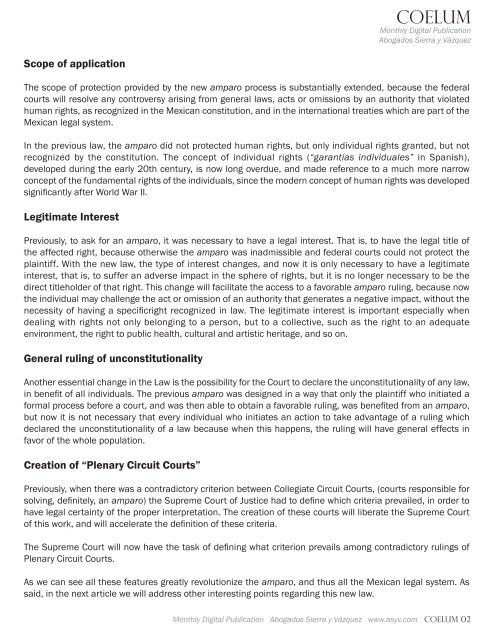Comments on the new Amparo Law. APRIL NEWS on Mexican ...
Comments on the new Amparo Law. APRIL NEWS on Mexican ...
Comments on the new Amparo Law. APRIL NEWS on Mexican ...
You also want an ePaper? Increase the reach of your titles
YUMPU automatically turns print PDFs into web optimized ePapers that Google loves.
COELUMM<strong>on</strong>thly Digital Publicati<strong>on</strong>Abogados Sierra y VázquezScope of applicati<strong>on</strong>The scope of protecti<strong>on</strong> provided by <strong>the</strong> <strong>new</strong> amparo process is substantially extended, because <strong>the</strong> federalcourts will resolve any c<strong>on</strong>troversy arising from general laws, acts or omissi<strong>on</strong>s by an authority that violatedhuman rights, as recognized in <strong>the</strong> <strong>Mexican</strong> c<strong>on</strong>stituti<strong>on</strong>, and in <strong>the</strong> internati<strong>on</strong>al treaties which are part of <strong>the</strong><strong>Mexican</strong> legal system.In <strong>the</strong> previous law, <strong>the</strong> amparo did not protected human rights, but <strong>on</strong>ly individual rights granted, but notrecognized by <strong>the</strong> c<strong>on</strong>stituti<strong>on</strong>. The c<strong>on</strong>cept of individual rights (“garantías individuales” in Spanish),developed during <strong>the</strong> early 20th century, is now l<strong>on</strong>g overdue, and made reference to a much more narrowc<strong>on</strong>cept of <strong>the</strong> fundamental rights of <strong>the</strong> individuals, since <strong>the</strong> modern c<strong>on</strong>cept of human rights was developedsignificantly after World War II.Legitimate InterestPreviously, to ask for an amparo, it was necessary to have a legal interest. That is, to have <strong>the</strong> legal title of<strong>the</strong> affected right, because o<strong>the</strong>rwise <strong>the</strong> amparo was inadmissible and federal courts could not protect <strong>the</strong>plaintiff. With <strong>the</strong> <strong>new</strong> law, <strong>the</strong> type of interest changes, and now it is <strong>on</strong>ly necessary to have a legitimateinterest, that is, to suffer an adverse impact in <strong>the</strong> sphere of rights, but it is no l<strong>on</strong>ger necessary to be <strong>the</strong>direct titleholder of that right. This change will facilitate <strong>the</strong> access to a favorable amparo ruling, because now<strong>the</strong> individual may challenge <strong>the</strong> act or omissi<strong>on</strong> of an authority that generates a negative impact, without <strong>the</strong>necessity of having a specificright recognized in law. The legitimate interest is important especially whendealing with rights not <strong>on</strong>ly bel<strong>on</strong>ging to a pers<strong>on</strong>, but to a collective, such as <strong>the</strong> right to an adequateenvir<strong>on</strong>ment, <strong>the</strong> right to public health, cultural and artistic heritage, and so <strong>on</strong>.General ruling of unc<strong>on</strong>stituti<strong>on</strong>alityAno<strong>the</strong>r essential change in <strong>the</strong> <strong>Law</strong> is <strong>the</strong> possibility for <strong>the</strong> Court to declare <strong>the</strong> unc<strong>on</strong>stituti<strong>on</strong>ality of any law,in benefit of all individuals. The previous amparo was designed in a way that <strong>on</strong>ly <strong>the</strong> plaintiff who initiated aformal process before a court, and was <strong>the</strong>n able to obtain a favorable ruling, was benefited from an amparo,but now it is not necessary that every individual who initiates an acti<strong>on</strong> to take advantage of a ruling whichdeclared <strong>the</strong> unc<strong>on</strong>stituti<strong>on</strong>ality of a law because when this happens, <strong>the</strong> ruling will have general effects infavor of <strong>the</strong> whole populati<strong>on</strong>.Creati<strong>on</strong> of “Plenary Circuit Courts”Previously, when <strong>the</strong>re was a c<strong>on</strong>tradictory criteri<strong>on</strong> between Collegiate Circuit Courts, (courts resp<strong>on</strong>sible forsolving, definitely, an amparo) <strong>the</strong> Supreme Court of Justice had to define which criteria prevailed, in order tohave legal certainty of <strong>the</strong> proper interpretati<strong>on</strong>. The creati<strong>on</strong> of <strong>the</strong>se courts will liberate <strong>the</strong> Supreme Courtof this work, and will accelerate <strong>the</strong> definiti<strong>on</strong> of <strong>the</strong>se criteria.The Supreme Court will now have <strong>the</strong> task of defining what criteri<strong>on</strong> prevails am<strong>on</strong>g c<strong>on</strong>tradictory rulings ofPlenary Circuit Courts.As we can see all <strong>the</strong>se features greatly revoluti<strong>on</strong>ize <strong>the</strong> amparo, and thus all <strong>the</strong> <strong>Mexican</strong> legal system. Assaid, in <strong>the</strong> next article we will address o<strong>the</strong>r interesting points regarding this <strong>new</strong> law.M<strong>on</strong>thly Digital Publicati<strong>on</strong> Abogados Sierra y Vázquez www.asyv.com COELUM 02


